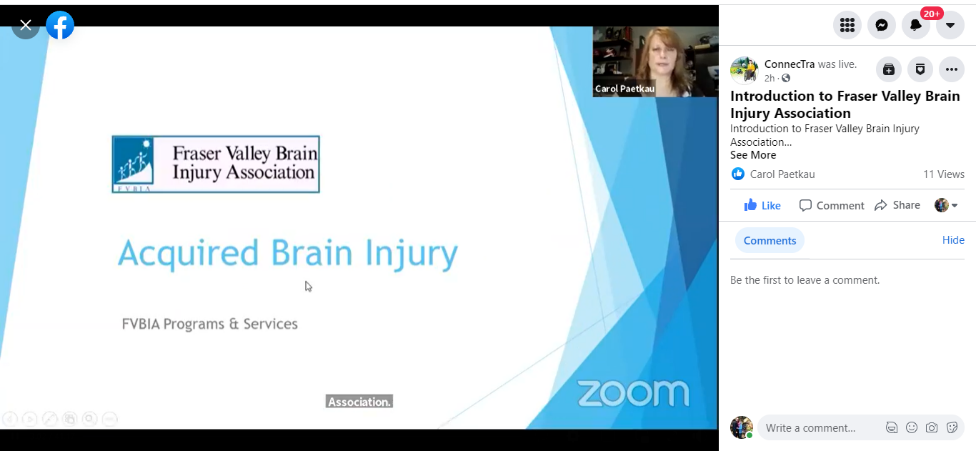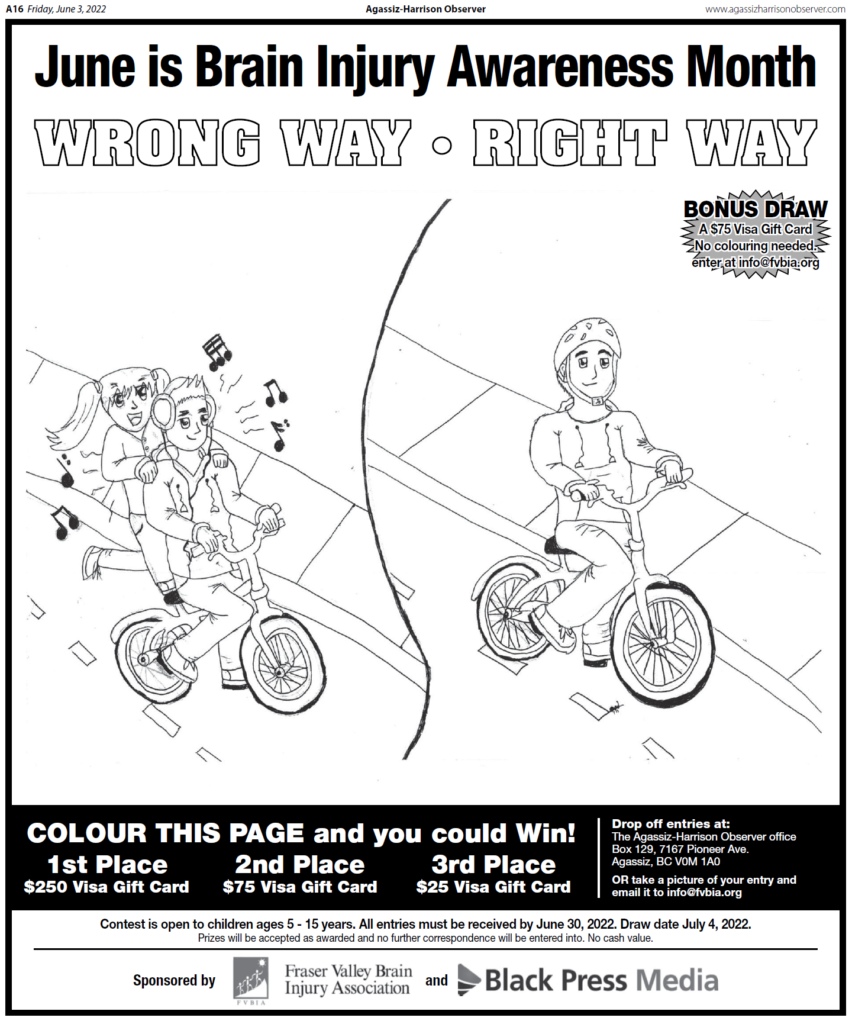Fraser Valley Brain Injury Association’s Executive Director, Carol Paetkau presents on brain injury and FVBIA’s services to ConnecTra viewers. https://fb.watch/8Jy23drZ1-/

FVBIA has created a reader-friendly emergency preparedness package geared towards people with acquired brain injuries, learning challenges and other cognitive challenges. For more detailed information about specific topics, please click on the links below. Emergency Preparedness Checklist How to Prepare for an Emergency What to Include in Your Emergency Kit How to Expand Your Emergency … Read more
Fraser Valley Brain Injury Association’s Executive Director, Carol Paetkau presents on brain injury and FVBIA’s services to ConnecTra viewers. https://fb.watch/8Jy23drZ1-/

Watch Rachel’s story after a workplace accident resulted in a traumatic brain injury and homelessness and the role Fraser Valley Brain Injury Association played in her journey.
By Don Lewis abilitylabs.com Initiating a venture when navigating the responsibilities of parenthood and the nuances of a disability presents an intricate landscape. Yet it’s precisely these intricacies that can help you carve out an entrepreneurial niche characterized by your own resilience, innovation, and uniqueness. This article from Fraser Valley Brain Injury Association offers some time-tested … Read more
By Dr. Douglas Lee One of the most common effects that occurs for individuals with brain injuries is brain fatigue. We have all likely had occurrences of this in our lives where we have had to manage too much information within a certain period of time and get to the point that we just can’t … Read more
By Dr. Douglas Lee Autonomic arousal is typically defined by the following symptoms: (1) Palpitations or pounding heart, or accelerated heart rate. (2) Sweating. (3) Trembling or shaking. (4) Dry mouth (not due to medication or dehydration). This is not a typical outcome of a brain injury but can happen. Such arousal is controlled by … Read more
By Dr. Douglas Lee For individuals with moderate to severe brain injuries it is oftentimes very challenging to be able, particularly in the moment, to see their role within the context of an event. This can be observed as them not anticipating that their actions may lead to a problem and/or not seeing themselves as … Read more
Brain Injury may change the way you relate to food. For some survivors, memory problems may affect food intake. Damage to the brain can cause an inability to feel full or hungry, causing you to eat too much or too little without realizing it. You may have a changed or absent sense of taste or … Read more
After a brain injury, every person’s need and abilities are different. Many people will have a rehabilitation program programmed specifically for them. Rehabilitation programs often will involve many types of healthcare providers such as: Counsellors: Counsellors help you solve problems and develop problem-solving skills by helping you clarify issues and explore your options. Family Doctors: … Read more
National Figures Expose the Nationwide Neglect of Individuals and Their Families August 2023 Today, a significant collaboration between Brain Injury Canada and the Canadian Traumatic Brain Injury Research Consortium (CTRC) called for moderate to severe Traumatic Brain Injury (TBI) to be officially classified as a chronic condition in Canada.This move would significantly enhance nationwide healthcare … Read more
Fraser Valley Brain Injury Association acknowledges that we work and gather on the traditional, ancestral and unceded territory of the Stó:Lō and Coast Salish People. Thank you to Jody Jones, First Nations Health Authority for connecting FVBIA with Indigenous Elder Amelia (right with Chilliwack Brain Injury Centre Manager Esther Tremblay). Elder Amelia shared stories, sacred … Read more
For parents and partners of people with acquired brain injuries The family support group offered by Chuck Jung & Associates has room for new members. Sessions are virtual and will be 1x/month. Registration is limited so please contact Chuck Jung Associates at admin@chuckjung.com or 604-874-6754 for more details.
Fraser Health Concussion Services Fraser Health’s Concussion Services is an early intervention and follow-up service for clients living with the effects of a recent concussion/mild traumatic brain injury (mTBI). https://www.fraserhealth.ca/Service-Directory/Services/Clinics/concussion-services#.YG9twmRKhaQ Canadian Concussion Centre The Canadian Concussion Centre has YouTube videos on the UHBToronto Youtube channel. https://www.youtube.com/watch?v=Kfa8npYcDj0 https://www.uhn.ca/Krembil/Canadian-Concussion-Centre CATT (Concussion Awareness Training Tool) The Concussion Awareness … Read more
By Frances McGuckin Did your brain injury rip your family into shreds? Being post-injury of 17 years, I still reel from the effects of how my car accident and subsequent traumatic brain injury tore our family apart. Today is no better than 17 years ago. I have lost my daughter, my little princess who could … Read more
Join us for a fun-filled evening at the FVBIA Pub Night Fundraiser on Sat, Apr 05, 2025 starting at 5:00 PM PDT. Get ready to enjoy a night of fun, food, games, and good company, all for a great cause. Bid for your chance to win One roundtrip flight for two guests to any regularly … Read more
Thank you to ICBC and Robin Newbery/Chris Gledhill for sponsoring FVBIA’s Brain Injury Awareness Picnic taking place on Saturday June 17, 2023.
Being a caregiver for someone living with a brain injury is no easy task. You have a lot of responsibilities, and it’s easy to get overwhelmed. But if you don’t practice self-care and keep your dreams in sight, you’ll be doing a disservice to your patients and yourself. The Fraser Valley Brain Injury Association has … Read more
By Don Lewis abilitylabs.com Image through Pexels Success in the business world depends less on an individual’s physical capabilities than their acumen, effort, and experience. If you are trying to find a path in life that you can pursue while living with disabilities, a career in business could be the right choice for you. Just … Read more
FVBIA holds an annual summer day camp for children with acquired brain injuries, siblings or children who have a parent with an acquired brain injury in August. This is an in-person day camp at the Blue Heron Reserve in Chilliwack, BC. Contact info@fvbia.org or 604-557-1913 for more information. Children that require 1:1 support must be … Read more
Congratulations to the winners of FVBIA’s Brain Injury Awareness Month contest! Thank you for entering.

The Road Ahead: Next Exit Hope! for ages 5 to 10 When someone we love has an acquired brain injury, it is the beginning of a new chapter in a family’s life. Brain injury affects the whole family. There are many questions and not enough answers. This material in this book is geared towards children … Read more